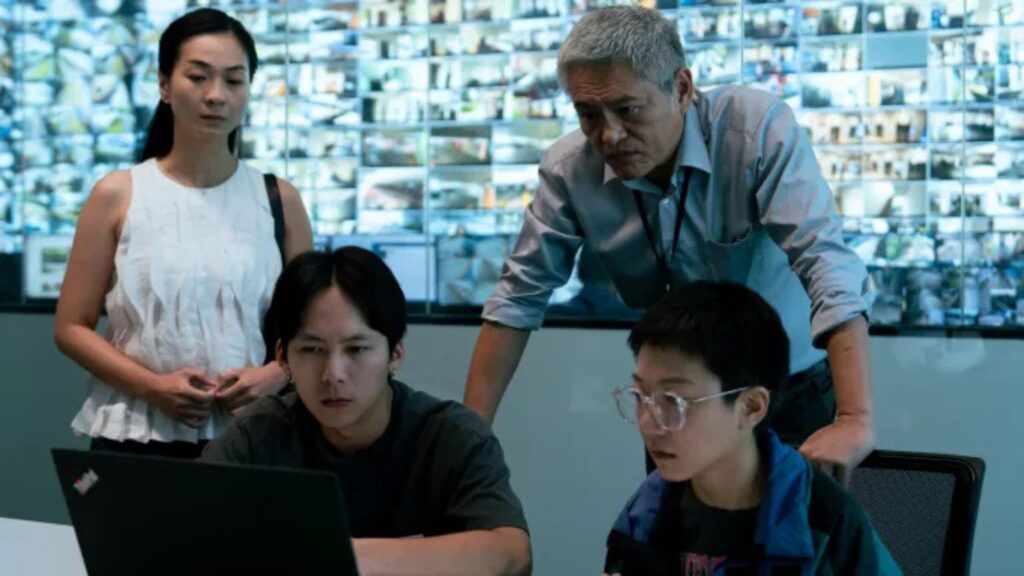Quick Facts & Overview
Title: Stranger Eyes (Original title: 默視錄 / Mò shì lù) .
Director & Writer: Yeo Siew Hua .
Runtime: ~126 minutes.
Genre: Mystery / Thriller / Drama — with strong elements of surveillance, voyeurism, psychological tension.
Countries of Production: Singapore, Taiwan, France, USA.
Language: Mandarin (plus possibly other local dialects).
Cast — Who’s in It & Key Players
Here are the main cast members, especially those with central roles:
| Actor | Role / Character |
|---|---|
| Wu Chien-ho | Junyang – young father whose daughter has gone missing. |
| Lee Kang-sheng | Lao Wu – the neighbor / voyeur figure who is filming the couple’s daily life. |
| Anicca Panna | Peiying – Junyang’s partner (mother) in the couple whose daughter is missing. |
| Vera Chen | Shuping – a supporting character (role less central but part of the family / neighborhood context). |
| Xenia Tan | Ling Po – another supporting role. |
| Pete Teo | Officer Zheng – the police / law enforcement connection. |
| Maryanne Ng-Yew | Mother Wu – Lao Wu’s mother. |
| Mila Troncoso | Ana – further supporting role. |
So, counting the above, there are at least 7–8 main / significant supporting actors with named roles. There may be minor or extra roles not always credited in the same places, but the narrative is concentrated on a small ensemble.
Who is the Means Character (Main Character)?
Though Stranger Eyes has multiple important characters, the emotional and narrative center is Junyang (Wu Chien-ho) and Peiying (Anicca Panna) — especially Junyang’s perspective. The plot is set in motion by their daughter’s disappearance. Their grief, suspicion, and need for answers drive the mystery. Lao Wu (Lee Kang-sheng) is also pivotal, especially as his voyeuristic gaze and ambiguity provide both threat and philosophical tension. But the story is built around the couple, especially Junyang, whose life crumbles and whose perception is challenged by what is seen and what is hidden.
Box Office / “Collection” / Commercial & Festival Performance
This is where the public data is much thinner. Stranger Eyes is more of a festival / arthouse / international co-production film than a mass box-office blockbuster. Here’s what we do know:
- According to its Wikipedia entry, Stranger Eyes has a reported gross of US$12,666 in (presumably) limited theatrical screenings.
- It premiered at the 81st Venice International Film Festival (2024), competing for the Golden Lion, which gives it prestige and visibility.
- It was also selected as the opening film for both the 2024 Taipei Golden Horse Film Festival and the 35th Singapore International Film Festival.
- It is the Singaporean entry for Best International Feature Film at the 98th Academy Awards.
So: festival recognition is strong; theatrical financial returns are minimal (which is typical for such films); its “box collection” in monetary terms is small, but its prestige “collection” (honors, nominations, critical accolades) is robust.
What is its Niche?
Stranger Eyes occupies a fairly specific niche characterized by:
- Surveillance / voyeurism thriller — exploring what it means to be observed, what boundaries privacy has, how technology & modern life erode those boundaries.
- Missing-child / family grief mystery — the emotional core is built around a child’s disappearance and the impact on relationships.
- Slow-burn psychological tension rather than action-oriented thrills. The pace tends toward methodical, reflective, uneasy.
- International co-production / arthouse drama — not aimed at blockbuster numbers, more at provoke, reflect, linger.

Deep Details: Story, Themes, Strengths & Weaknesses
Plot & Structure (without full spoilers)
(Spoiler-light summary) The film begins with Junyang and Peiying, a couple whose infant / young daughter vanished. The police investigation has produced little. Some time later, they begin to receive mysterious DVDs that contain footage of their daily lives — covert recordings from inside their own home, apartment, etc. The source is Lao Wu, a neighbor / voyeur with a video camera. The couple become obsessed (or driven) to find out whether this person is responsible for their daughter’s disappearance, how much he saw, what his motives are, and whether what is shown in the footage reveals more than just external events — revealing cracks in their relationship, secrets, guilt, suspicion. As they dig, the film alternates between what they see (or think they see), what is recorded, and what is hidden. There are moments of confrontation, of guilt, of confusion; an interplay between memory, suspicion, what is observed vs what is felt. The ending resolves some threads but leaves others ambiguous — in line with its theme of not everything being knowable.
Themes & Deeper Meanings
- Voyeurism, surveillance, and privacy
Stranger Eyes asks: what does it mean when we are recorded without our consent? How does that change our relationships, our sense of self? The DVDs sent to the couple serve as a medium of both violation and revelation. It’s about watching, being watched, and how seeing changes you. - Grief, guilt, and memory
The disappearance of the child leaves both Junyang and Peiying in a liminal state — guilt over what might have been prevented, grief over what is lost, and a longing for answers. The recordings force them to confront daily moments — what they said, what they didn’t, what actions may have been meaningful in hindsight. - The fallibility of vision / trust
Not everything recorded is truth, or at least what is recorded is mediated by a camera, by framing, by what is left out. The film plays with what is trustworthy: Junyang’s memory, what Peiying recalls, what the recordings show, what Lao Wu saw (or claims). Trust between spouses, trust in law enforcement, trust in one’s own perceptions is tested. - Estrangement & relationship breakdown
The couple are described in places as estranged, or at least their relationship is under strain (pre-loss and post-loss). The surveillance episodes dredge up old conflicts, hidden resentments, secrets. The film uses the mystery not just to scare but to examine how relationships survive (or do not) under extreme pressure and loss. - Identity & what being “seen” means
There’s a duality: we want to be seen (recognized, understood), yet fear what being seen exposes. Lao Wu’s camera sees, the CCTV sees, the couple is exposed, but also the characters themselves start to see different parts of themselves. What public/private self do they want to maintain?
Strengths — What Stranger Eyes Does Well
- Strong performances, especially Lee Kang-sheng. Many critics highlight his presence as anchoring the film’s unsettling gaze. He plays the voyeur with ambiguity — not purely villainous, but complex. Wu Chien-ho and Anicca Panna do well in roles that demand grief, doubt, and emotional vulnerability.
- Atmosphere & tension: the film builds unease gradually — through everyday domesticity, small oddities, silence, the implied threat of being observed. It doesn’t go for jump scares but for creeping dread and moral discomfort. That makes many moments linger.
- Cinematic references & style: viewers familiar with Cache (Michael Haneke) or Rear Window will find resonances — the idea of surveillance, voyeurism, unseen watchers, the ethics of looking. Stranger Eyes uses these not just as homage but to probe modern variations (digital media, cameras everywhere, what we post, what we hide).
- Ambiguity & moral complexity: the film doesn’t resolve everything neatly. For some viewers that is frustrating; for others it is what makes it interesting — the idea that loss, voyeurism, guilt have no clean edges.
Weaknesses / Criticisms
- Pacing & coherence: Some critics feel the film’s concept is strong but that the execution gets mired in loose threads; that momentum wanes especially in the second half. There are moments when the buildup of mystery overtakes clarity, and the emotional stakes seem diffused.
- Predictable or formulaic moments: While many praise the film’s twistiness, others argue that some revelations follow thriller tropes too closely, which dilutes surprise. The problem in such films is that when tropes are used without subversion, they feel predictable. Several reviews express that sense.
- Emotional impact vs. analytical distance: The film’s style sometimes prefers detachment, observation over immersion. Some viewers may feel emotionally distanced from the couple’s suffering because the film gives space for ambiguity rather than catharsis.
- Limited commercial reward: The gross figure is very small, meaning that theatrical reach / financial gain is minimal. For viewers who are more interested in widespread entertainment or mainstream thrillers, Stranger Eyes may feel too niche or slow.
Critical Reception & Awards / Festival Buzz.
On Rotten Tomatoes, Stranger Eyes has a fairly strong critics’ rating (Tomatometer around 84%) for its premise, performances, and concept, though audience ratings are lower in some places.
Reviews from The Hollywood Reporter describe it as “a slippery, well-acted Singaporean thriller about observation and surveillance.”
The Film Stage praises the disquiet, the mystery tone, especially Lee Kang-sheng’s performance.
At film festivals: premiered at Venice in competition, opening film for several festivals. It’s been Singapore’s selection for Best International Feature at the Oscars. So well regarded in the critique / festival circuits.
Final Thoughts / Viewer’s Verdict.
If I were to give a verdict:
- Stranger Eyes is a film for viewers who enjoy being unsettled rather than simply startled; who prefer mysteries that upset more than resolve. It’s well suited to those who like thinking about what it means to watch and be watched, about the fragility of trust, about grief and longing, about what’s hidden in everyday gestures.
- It’s less well suited if you want tight plot resolution, high pacing, horror or thriller shocks, or a mainstream commercial thriller.
So yes — it’s worth watching, especially for its performances (Lee Kang-sheng in particular), atmosphere, and its probing of modern voyeurism. It’s one of those films that stays with you, not because it gave all the answers, but because of how it raised uncomfortable ones.
Summary Table of Stranger Eyes.
| Element | Details |
|---|---|
| Principal Cast | Wu Chien-ho (Junyang), Lee Kang-sheng (Lao Wu), Anicca Panna (Peiying), Vera Chen (Shuping), Xenia Tan (Ling Po), Pete Teo (Officer Zheng), Maryanne Ng-Yew (Mother Wu), Mila Troncoso (Ana). |
| Main Character(s) | Junyang (and Peiying) – the parents, especially Junyang, whose search and perceptions propel the plot; Lao Wu is major secondary with ambiguous placement. |
| Box Office / Commercial Performance | Very small theatrical gross (~US$12,666) for limited screenings; stronger presence in film festivals & critical reception; not a mainstream commercial hit. |
| Niche | Art-house surveillance / voyeurism thriller; missing-child mystery; slow-burn psychological tension; international co-production; audience more festival / critic than mass multiplex. |
| Strengths | Performances, mood & atmosphere, ethical / philosophical themes, voyeurism, ambiguity; production craft; festival recognition. |
| Weaknesses | Pacing, narrative loose ends, possibly too restrained / ambiguous for some audiences; limited commercial reach; partly formulaic tropes. |





